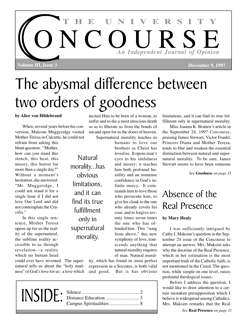The abysmal difference between two orders of goodness
by Alice von Hildebrand
When, several years before his conversion, Malcom Muggeridge visited Mother Teresa in Calcutta, he could not refrain from asking this blunt question: “Mother, how can you stand this stench, this heat, this misery, this horror for more than a single day?” Without a moment’s hesitation, she answered: “Mr. Muggeridge, I could not stand it for a single hour if I did not love Our Lord and did not contemplate the Crucifix.”
In this single sentence, Mother Teresa opens up for us the reality of the supernatural, the sublime reality accessible to us through revelation—a reality which no human head could ever have invented. The supernatural tells us about the “holy madness” of God’s love for us: a love which incited Him to be born of a woman, to suffer and to die a most atrocious death so as to liberate us from the bonds of sin and open for us the doors of heaven.
Supernatural morality teaches us humans to love our brothers as Christ has loved us. It opens man’s eyes to his sinfulness and misery; it teaches him both profound humility and an immense confidence in God’s infinite mercy. It commands him to love those who persecute him, to give his cloak to the one who already covets his coat, and to forgive seventy times seven times the one who has offended him. This “song from above,” this new symphony of love, transcends anything that natural morality requires of man. Natural morality, which has found its most perfect expression in a Socrates, is both valid and good. But is has obvious limitations, and it can find its true fulfillment only in supernatural morality.
Miss Joanna K. Bratten’s article in the September 24, 1997 Concourse, praising James Stewart, Victor Frankl, Princess Diana and Mother Teresa, tends to blur and weaken the essential distinction between natural and supernatural morality. To be sure, James Stewart seems to have been someone who lead a good life; someone whose fame never went to his head. And Victor Frankl was indeed a truth-loving thinker; (by the way, it was my late husband who discovered him in Vienna and who published in his anti-Nazi magazine the young psychiatrist’s very first article.) And Princess Diana certainly showed a loving interest in the sick and deprived. But these examples of natural morality cannot be compared with the totally new supernatural life of Mother Teresa. Her life is not only inconceivable, but also plainly impossible without supernatural grace. An abyss separates her deeds and attitudes—stamped with the supernatural love of Christ—from the merely naturally good behaviors of the other three persons.
Of course Miss Bratten, being a Roman Catholic, would certainly admit that Mother Teresa is “superior” to the others. But unfortunately the exact nature of this superiority is not properly identified or illumined in her article. This blurring is more serious than might at first appear. The great danger today is to play loose with the key notion of hierarchy. We flout the hierarchy of being when we take great pains to save a baby whale even as we continue to murder human beings by the millions. And we distort the hierarchy of values when we rate humans according to their fame or success or accomplishments; when we place “doing” or “having” above being. We show more respect to a scholar than to a priest and we praise efficiency over holiness.
Let us indeed note the good qualities of a James Stewart; let us be grateful for the valuable contributions made by the noble Victor Frankl; let us rejoice to find some lights in the tragic life of Princess Diana; (I personally, however, would not recommend her as a role model for any young girl.) All the time, nevertheless, let us appreciate that Mother Teresa’s life represents something altogether different—and higher. She belongs to “another world,” the world of grace and of the supernatural, the world accessible to man only through Christ’s death on the cross. It is regrettable that the uniqueness of this supernatural world is not properly highlighted in Miss Bratten’s article.
We should of course pray for Princess Diana, but also we should carefully refrain from comparing her to someone to whom, hopefully, we shall pray—when she is proclaimed one of God’s saints.
Dr. von Hildebrand, widow of Catholic philosopher Dietrich von Hildebrand, collaborated with her husband on many of his works, while producing several of her own. She taught philosophy at Hunter College in New York for over thirty years and is currently in Alabama, hosting a series of programs for Mother Angelica’s EWTN. Professor von Hildebrand is also a member of the FUS board of trustees.


